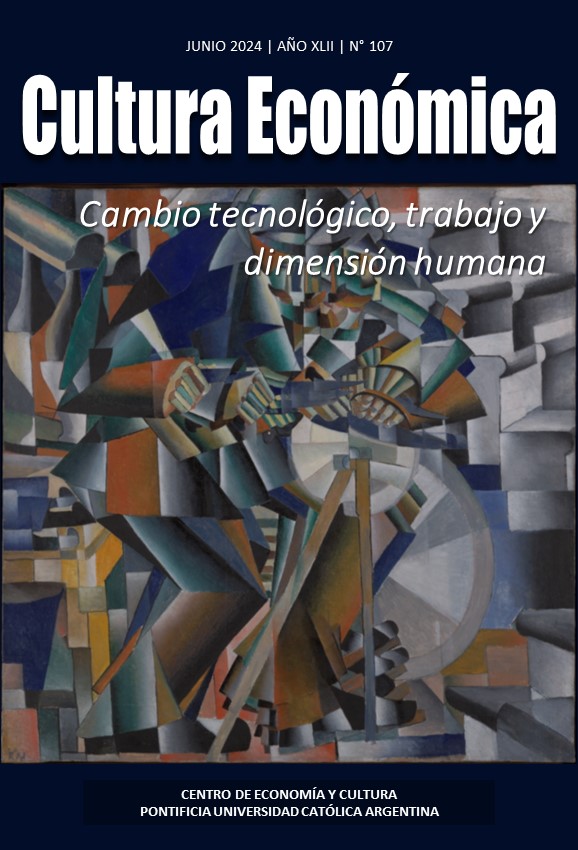Monastic Culture in the Face of Human Nature: Analysis of the Rule of St. Benedict
DOI:
https://doi.org/10.46553/cecon.42.107.2024.p66-78Keywords:
rule, Saint Benedict, material, culture, needs, satisfiersAbstract
The Rule of St. Benedict has gained certain notoriety in the present times, since different interpretations are being made, even from intellectual spheres that do not draw from Christianity. Likewise, cultural references within the Catholic Church have recovered it in order to update it and contextualize it in areas that go beyond the strictly monastic walls. These novel hermeneutical proposals have succeeded in having the writings of the saint of Nursia revisited, and have aroused interest in generating alternative readings. The following lines are the fruit of these initiatives, whose particularity lies in the application of the critical economic categories of the Human Scale Development of Manfred Max-Neef et al. to the Benedictine monastic rule.
Downloads
References
Agamben, G. (2018). Altísima pobreza. Reglas monásticas y forma de vida. Adriana Hidalgo editora.
Barnebeck Andersen, Th., Bentzen, J., Dalgaard, C-J., & Sharp, P. (2017). Pre-reformation roots of the protestant ethic. The Economic Journal, 127(604), 1756–1793.
Barthes, R. (2005). Cómo vivir juntos: simulaciones novelescas de algunos espacios cotidianos. Siglo XXI Editores Argentina.
Benedicto XVI (2008). Audiencia General. 9 de abril. Vatican. https://www.vatican.va/content/benedict-xvi/es/audiences/2008/documents/hf_ben-xvi_aud_20080409.html
Benedicto XVI (2005). Audiencia General. 27 de abril. Vatican. https://www.vatican.va/content/benedict-xvi/es/audiences/2005/documents/hf_ben-xvi_aud_20050427.html
De la Torre, J. M. (1980). La obediencia benedictina y la pedagogía del corazón. Cistercium, Núm. 157 (número extraordinario), 111-128.
De Pascual, F. (1992) Hospederías monásticas hoy. El humilde servicio de acoger. Nova et vetera: temas de vida cristiana, Núm. 35, 195-229.
De Vogüé, A. (1971). La Règle de saint Benoît. tome VI. Commentaire historique et critique (Parties VII-IX et Index). Sources chrétiennes.
Delatte, P. (1992). Comentario a la Regla. Nova et vetera: temas de vida cristiana, Núm. 35, 231-242.
Dreher, R. (2019). La opción benedictina. Una estrategia para los cristianos en una sociedad postcristiana. Encuentro.
Dussel, E. (2014). 16 tesis de Economía Política. Una interpretación filosófica. Siglo XXI Editores.
Dussel, E. (2013). Filosofía de la poiésis. En E. Dussel, Hacia una estética de la liberación (pp. 11-114). Docencia.
Dussel, E. (2007). Política de la Liberación. Volumen I. Historia mundial y crítica. Trotta.
García Colombás, M. (2006). La Regla de San Benito. (I. Aranguren, Trad.) Biblioteca de Autores Cristianos.
García Colombás, M. (2004). El monacato primitivo. Biblioteca de Autores Cristianos.
García Colombás, M. (1982). Colaciones 1. El espíritu de San Benito. Monte Casino.
Gregorio Magno (2010). Libro II de los “Diálogos”. Vida y milagros del venerable Benito. En AA. VV., San Benito. La Regla/San Gregorio Magno. Libro II de los Diálogos. Biblioteca de Autores Cristianos.
Jedrzejczak, G. (2018). Introducción a la Regla de San Benito. Segunda parte. Cuadernos Monásticos, Núm. 205, 118-143.
Juan Pablo II (1980). Carta Apostólica Sanctorum altrix del Sumo Pontífice Juan Pablo II, en el XV Centenario del nacimiento de San Benito, patrono de Europa. Mensajero de paz. Vatican. https://www.vatican.va/content/john-paul-ii/es/apost_letters/1980/documents/hf_jp-ii_apl_11071980_sanctorum-altrix.html
Kersting, F., Wohnsiedler, I., & Wolf, N. (2020). Weber revisited: The protestant ethic and the spirit of nationalism. The Journal of Economic History, 80(3), 710-745.
Kodel, J. (2013). Mutual obedience: My brother’s need is the voice of God. The American Benedictine Review, 64(4), 404-411.
Lapponi, M. (2018). San Benito y la vida familiar. Una lectura original de la Regla benedictina. Athanasius Editor.
Max Neef, M., Elizalde, A., & Hopenhayn, M. (ed.) (2010). Desarrollo a Escala Humana. Opciones para el futuro. Biblioteca CF+S.
Pablo VI (1964). Carta Apostólica Pacis Nuntius del Sumo Pontífice Pablo VI. Proclamación de San Benito como Patrono de Europa. Vatican. https://www.vatican.va/content/paul-vi/es/apost_letters/documents/hf_p-vi_apl_19641024_pacis-nuntius.html
Peretó Rivas, R. (2021). El nacimiento de la cultura cristiana. Lectio.
Senior, J. (2019). La muerte de la cultura cristiana. IVAT SL.
Senior, J. (2016). La restauración de la cultura cristiana. Vórtice.
Veronesi, B. (1983). La culpa y su corrección en la Regula benedicti. Cistercium, Núm.164, 39-78.
Veronesi, B. (1982a). La culpa y su corrección en la Regula benedicti. Cistercium, Núm. 161, 37-50.
Veronesi, B. (1982b). La culpa y su corrección en la Regula benedicti. Cistercium, Núm. 162, 117-126.
Downloads
Published
How to Cite
Issue
Section
License

This work is licensed under a Creative Commons Attribution-NonCommercial-ShareAlike 4.0 International License.













